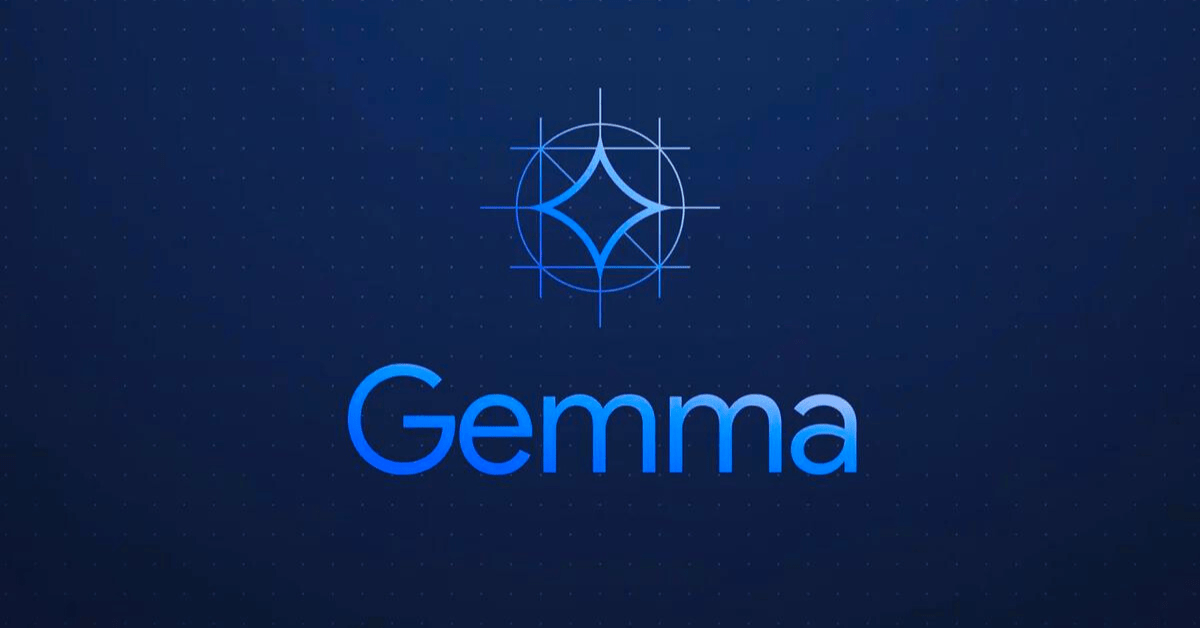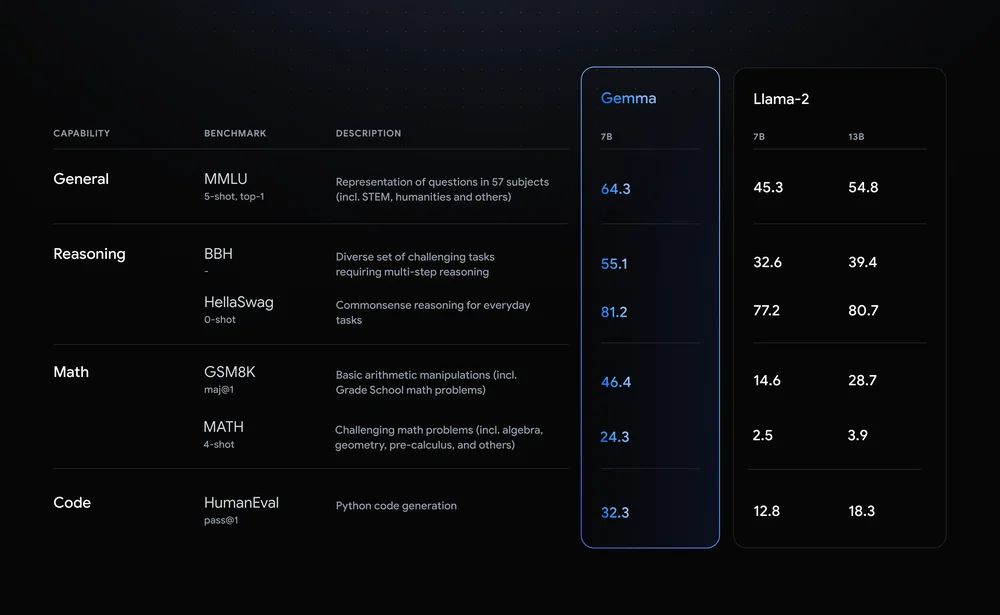Gemma: Google releases new family of open models

Google has announced a new AI model specifically for developers, indicating a slowdown in its pace of AI releases, marking the third significant AI announcement this month. Google has introduced Gemma, a collection of lightweight, open models developed by DeepMind and other Google AI development and research teams.
Google’s Gemma, a spinoff of Gemini, is an AI model built on the same research and technology used to create the Gemini models. Available in two weight sizes, Gemma 2B and Gemma 7B, each with pre-trained and instruction-tuned variants, it can run on various devices.
Google reports that Gemma models outperformed larger open models like Meta’s Llama-2 in key benchmarks for reasoning, math, and code.

Google’s Responsible Generative AI toolkit offers best practices resources for promoting responsible use of open models like Gemma. However, It is an “open model” rather than an “open-sourced” model, allowing users full creative autonomy without restrictions. This distinction is crucial in understanding the difference between the two terms.
Google has made Gemma an open model, allowing access, redistribution, and variant creation, but also implementing limitations to prevent misuse.
Google has announced that Gemma models are now available for the free access in Kaggle, a free tier for Colab notebooks, and $300 in credits for first-time Google Cloud users. The company has implemented safeguards to ensure safe and reliable usage, including automated techniques to screen out personal information and sensitive data, reinforcement learning from human feedback, and robust model evaluations. This move reflects Google’s commitment to responsible AI development and increased access to the technology.
Understanding Gemma:
Google’s latest AI product, Gemma, is designed specifically for developers, offering a unique combination of features that set it apart.
Lightweight Design: Gemma’s lightweight design prioritizes accessibility, with its 2B and 7B parameter models running efficiently on personal computers, allowing developers with limited resources to explore AI’s power, democratizing access to advanced technology.
Open-Source Philosophy: Its open-source philosophy encourages collaboration among developers by allowing them to freely access, customize, and share models, fostering a vibrant community where they can learn from each other and push boundaries.
Tailored Options: Gemma provides tailored options for developers, offering pre-trained models for general tasks and instruction-tuned variants for specific domains. This flexibility allows developers to choose the right tool for their needs, such as creating chatbots or content for specific audiences.
Comparison with Gemini: Google’s AI family, Gemini and Gemma, differ in their targets. Gemini, larger and more powerful, focuses on research and large-scale applications, while Gemma prioritizes developer accessibility and agility, fostering community building and enabling a wider range of creators and innovators.
It provides lightweight, open-source models with pre-trained and customizable options, enabling developers to explore AI’s potential in various fields, marking a significant step towards democratizing AI and fostering a collaborative community for its future.
Why Open Source Gemma Empowers Developers
Gemma’s open-source philosophy empowers developers, not just as a technical detail.
Customization Unlocked: Open-source Gemma allows developers to customize its capabilities for specific tasks, enabling them to create bespoke AI experiences. This openness fuels innovation and allows developers to create chatbots that reflect brand voice or generate code tailored to their project’s architecture.
Accessibility for All: Its lightweight design and open-source availability make it accessible to developers with limited resources, democratizing AI and allowing individuals and smaller teams to experiment and build innovative solutions. This reduces the barrier to entry, attracting a diverse talent pool to contribute to the AI landscape.
Collaboration is Key: The open-source model fosters a community of developers who share experiences, troubleshoot challenges, and learn from each other, accelerating innovation and problem-solving. This collective knowledge base can be seen as a global network pushing the boundaries of Gemma.
Responsible AI at Heart: Google’s commitment to responsible AI is evident in its use of open-source Gemma, ensuring ethical and responsible use. The release of a responsible generative AI toolkit empowers developers to mitigate potential biases and harmful outputs, fostering trust and empowering them to create ethical AI solutions.
Also: Microsoft Designer: A Powerful Tool for Image Creation and Editing
Google’s open-source Gemma platform fosters a responsible and innovative future for AI through customization, accessibility, and collaboration. Its developer community’s collective creativity is at its core, allowing developers to explore and contribute to shaping the future of AI.
Potential Applications for Developers
Gemma provides developers with a versatile toolkit that allows them to integrate AI tools seamlessly into their workflow across various industries.
Chatbots with Personality: Its open-source nature allows developers to create personalized chatbots, allowing them to understand user nuances and tailor interactions, thereby fostering empathy and creating unique and engaging experiences through specific dataset training.
Content Creation on Demand: Its text generation capabilities enable developers to automate content creation, saving time and resources while ensuring consistent brand messaging through the creation of marketing copy, product descriptions, or scripts.
Coding with an AI Partner: Gemma’s AI assistant enhances productivity and innovation by completing code snippets, suggesting optimizations, and generating entire functions based on user specifications.
Beyond these broad examples, the open-source nature fuels even more creativity:
- Community-Driven Advancements: Gemma’s capabilities can be significantly enhanced by allowing developers to share custom models and extensions, thereby accelerating innovation.
- Industry-Specific Solutions: It can be customized to specific fields like healthcare or finance, allowing for the creation of specialized tools for various industries.
- Experimentation without Limits: The open-source environment fosters curiosity and risk-taking, resulting in unexpected discoveries and innovative applications.
Google offers resources like the responsible AI toolkit and a supportive community forum to empower developers to address potential training model biases.
It is an AI model that encourages developers to co-create the future by leveraging its open-source nature and versatile features to create groundbreaking applications across various industries, allowing developers to unleash their imagination.
Conclusion
Google’s release of Gemma, a family of lightweight, open-source models, has revolutionized AI strategy by allowing developers worldwide to create innovative AI solutions. The open-source nature fosters a vibrant community, allowing individuals and smaller teams to contribute, pushing the boundaries of AI further. This democratization of access fuels a diverse and inclusive AI landscape.
Google’s Gemma platform is a collaborative tool for AI development, promoting ethical use and fostering trust. The platform’s terms of use and accompanying toolkit ensure ethical use and mitigate potential biases. Developers are encouraged to explore and join the movement for a responsible and innovative future. As an evolving platform, Google continues to invest in its development, with boundless possibilities and the journey just beginning.










